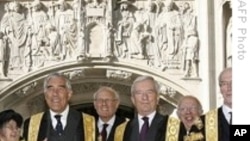A new high court has begun proceedings in Britain, replacing the
appeals court in the House of Lords. Its title, "The Supreme Court,"
has led some British lawyers to be concerned that it might eventually
take on powers like the American Supreme Court, which can strike down
laws. Its proponents say
the court is a healthy separation of the judiciary from the
legislature.
Eleven Supreme Court Justices were sworn in to the country's new highest court.
"I now invite your Lordship to take the oaths required of you by law."
The
new court building is on London's Parliament Square, next to
Westminster Abbey, and across from the Houses of Parliament
where the Law Lords Court used to be.
Senior lawyer Hugh Tomlinson says the move is important.
"Many
people were confused in the old days between the House of Lords as a
court and the House of Lords as a legislative body and a new Supreme
Court will get over that confusion. It will symbolically reinforce the
independence of the judiciary, which I think is a very good thing," said Tomlinson.
The
court is promising open access, televising proceedings for the first
time in British history. Another improvement says Tomlinson.
"Televising
proceedings is a very good idea ... for two reasons; first, it will
enable people to see how seriously the cases are taken, how the
argument is done, and secondly, it will lead to both the lawyers and
the judges perhaps expressing themselves in a clearer and more
publicly accessible way," said Tomlinson.
But not
everyone thinks the invention of a Supreme Court for Britain is a wise
decision. Lord Neuberger, a former law lord, warned the creation of
the court was meddling with Britain's constitution and could have
unforeseen consequences.
Lawyer Dan Tench says Neuberger is not the only one concerned.
"What
people are particularly looking for is whether our highest court will
now take a more aggressive approach against parliament and against the
executive and be more intervening in decisions," Tench said.
That would be like the American Supreme Court, and Tench says the British version will not end up that way.
"I
think that is very unlikely. The British judiciary in many ways is
very set in its ways, and I think that the time honored customs of the
British judiciary and its approach is unlikely to be Americanized," Tench said.
Its decisions will be widely watched, he says.
"The
decisions from the highest court in the United Kingdom are extremely
influential around the world. They obviously have some influence in
the United States as the decisions of the United States Supreme Court
have are influential over here," Tench said.
The
court's first case involves human rights and terrorism. The case
challenges the British government's right to create laws without a vote
in Parliament. Six terrorism suspects have had their assets frozen,
even though they have not been convicted of funding terrorism.
News
Britain's New Supreme Court Opens, Separating Judiciary From Legislature
update

<!-- IMAGE -->




